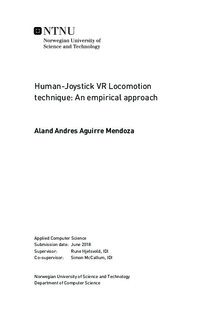Human-Joystick VR Locomotion technique: An empirical approach
Master thesis
Permanent lenke
http://hdl.handle.net/11250/2502555Utgivelsesdato
2018Metadata
Vis full innførselSamlinger
Sammendrag
Virtual Reality (VR) has been successfully applied with a broad range of locomotion techniques. Many of these locomotion techniques have different challenges and benefits. In the following thesis, the Human-Joystick (or leaning based) technique is explored in depth. The aforementioned locomotion technique is explored through an empirical approach. This approach is used to assess the underlying challenges that can be present. For this, a prototype of a VR application aimed to assess speed of completion is conceived and tested. A total of 20 users tested the prototype during a two-trial period. Results showed that there is an increase in Speed of completion obtained by the users from the First try to the Second try. This results are to be expected and are well discussed and interpreted. Furthermore, results show that Human-Joystick technique is an efficient locomotion technique in terms of ease of use and speed. Moreover, a qualitative review is done based on the feedback provided by each participant. A significant contribution of the user testing lies in the proposed qualitative challenges that are explained. These qualitative challenges serve as opportunities for future game designers and developers to build upon. Many proposed future work recommendations are done which can benefit game designers, developers and enthusiasts alike.
